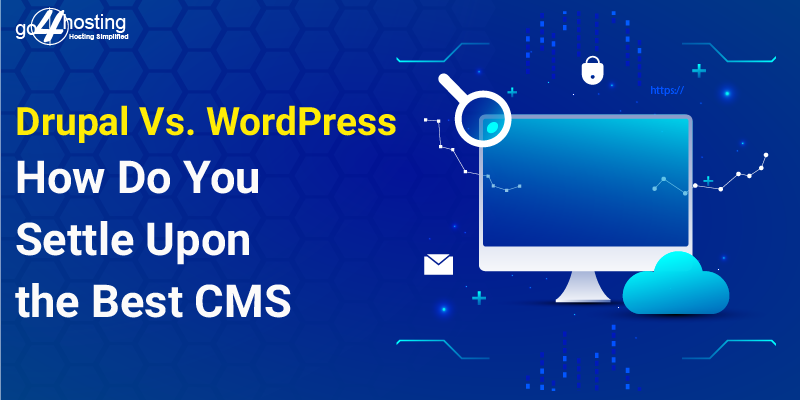Drupal Vs. WordPress – How Do You Settle Upon the Best CMS

There are quite a few popular content management systems (CMSs) available in the market place to help you develop a nice and functional website. However, there are three most popular CMSs that occupy the majority of market share – Drupal, Joomla and WordPress. For a layman, the availability of more than one quality CMS and an extensive variety of important features and benefits associated with each often possess a problem of plenty.
People are often confused about which one is best and meet their website design and development expectations closely. Questions like which one is better? What are their distinguishing features? Which will serve my cause better? How they fair on efficiency quotient and ease of use? How do they fair on functionality factor? What are the advantages and disadvantages of using either of them? etc keep playing on one’s mind.
In this blog we shall talk exclusively about two best rated content management systems (CMSs)—WordPress and Drupal. We shall also deal in detail with the pros and cons of using each and seek to find out which one will serve your cause better in keeping with your website requirements.
Although both systems allow users to create and manage content over one or multiple websites, there are some significant differences between the two. A meaningful insight into as to how they work, what are their strong points and their unique benefits will enable you to make a better and more informed decision. The primary objective of this blog is to give you a through overview of WordPress and Drupal so that you can settle upon any particular CMSs with much more confidence.
WordPress
This is arguable the best, most popular and easy to use CMS system available in the market. Undisputed leader as far as CMSs are concerned, it enjoys popularity that exceeds Drupal by several notches. Starting out as a simple blogging system, WordPress owing to its simplicity quickly ascended the popularity charts and became a full-fledged and fully-functional content management system in a very short period of time. WordPress today holds the distinction of being the largest self-hosted blogging tool in the world, currently powering close to 25% website on the Web. WordPress as such is the most ideal platform for beginner bloggers and website developers. This though, in no way suggests it is not suitable for advanced web developers who can have a lot of fun with all the creative ways to customise.
Some of the important advantages offered by WordPress are as following:
- Easy to learn and use as no extensive HTML knowledge is required.
- Search engines show a greater love for WordPress making it the ideal CMS to develop SEO optimised websites.
- WordPress is 100 per cent customisable with thousands of free (and paid) themes, plugins and tools.
- Upgrades are done automatically negating any need of manual interference by website owners.
- Gives owners complete control of their site without having to wait for web developers
- WordPress enjoys huge community support.
Disadvantages of using WordPress
- As mentioned above, WordPress keeps updating at frequent intervals. Some plugins as such may not adapt as quickly to the changes leading to depressed performance.
- Users have to have knowledge of CSS and HTML to employ graphic changes.
- Permalinks are numeric until user knowingly activates the SEO friendly feature
- Large volume of content handling may slow down the system
The worst feature
WordPress is extremely vulnerable to plugins viruses, which have the potential of wiping out entire pages.
Drupal
Drupal is more popular amongst NGOs, government agencies, higher educational institutions, etc. It is an incredibly powerful framework that can serve as a solid foundation for virtually any type of website. Drupal as such is more ideal for people with advanced and sophisticated knowledge of web development. Though way behind WordPress in number of users, Drupal too has an active and large community, which is always eager to provide meaningful and relevant answers to your queries.
Advanced features and unique customisation abilities makes Drupal a dream CMS for creating attractive and powerful websites.
Advantages of Drupal
- Advanced control over URL structure
- Unlike WordPress, it possess the ability to seamlessly handle large volumes of content
- Drupal offers enterprise grade security
- Supports multiple site stakeholders (admin, editors, logged in users requiring customized content, private groups, etc.)
- Drupal is intended for building high performance websites with advanced features
- Drupal offers greater degree of flexibility and versatility
- Pages tend to load faster due to its defaulting caching features
Disadvantages of Drupal
- Requires expert technical knowledge
- Updates require manual intervention
- Premium themes and plugins (modules) cost a lot more than WordPress
The worst feature
It is extremely difficult to install





